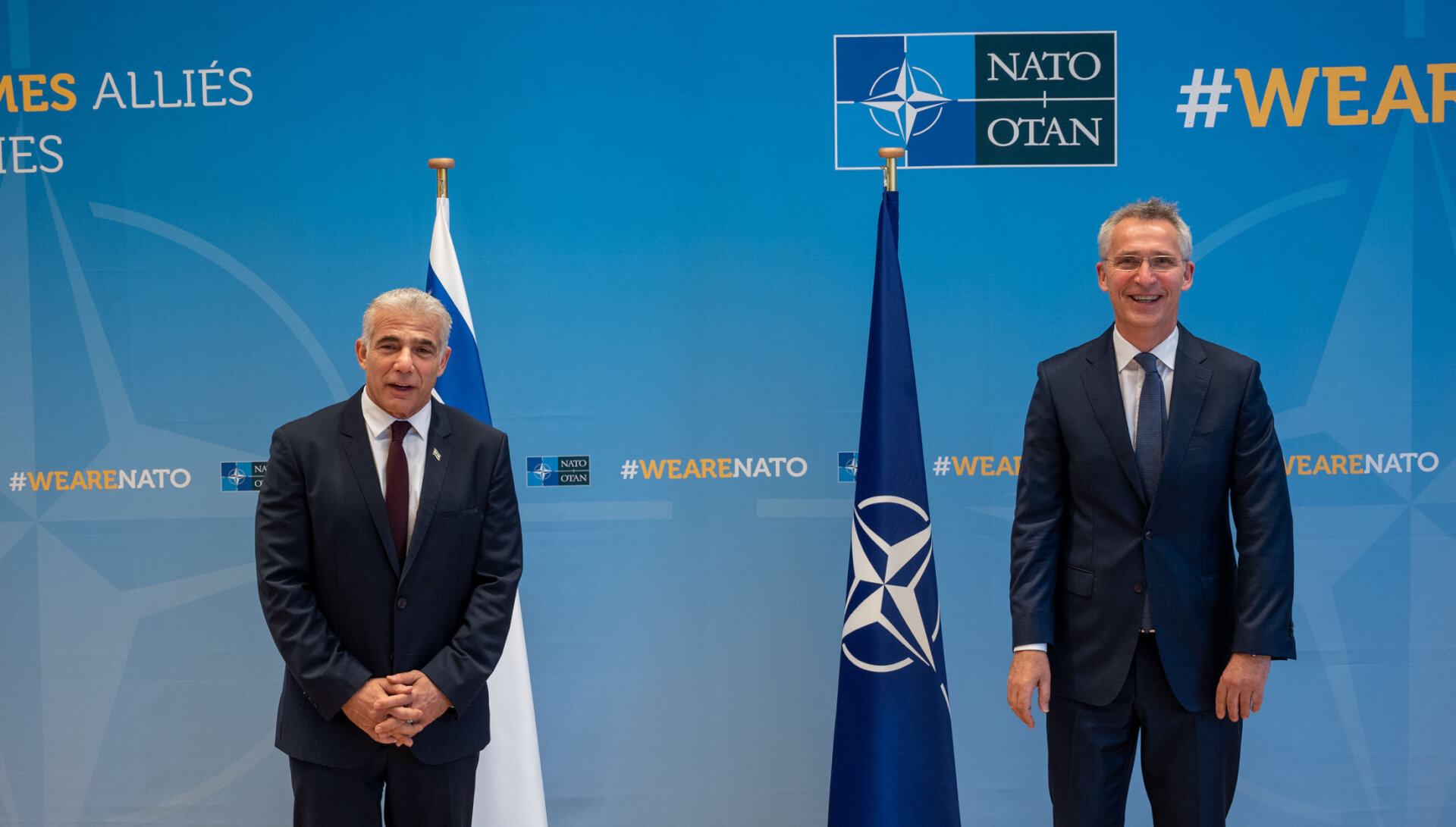Israeli Foreign Minister (FM) and Alternate Prime Minister Yair Lapid met North Atlantic Treaty Organization (NATO) Secretary-General Jens Stoltenberg at the Alliance’s headquarters in Brussels on Monday to discuss Iran’s nuclear programme, defence ties, and regional security. Lapid also held talks with his European Union (EU) counterparts on improving bilateral relations.
Lapid’s trip to Brussels comes as Israel expressed concerns over the restoration of the 2015 nuclear deal, calling Iran’s nuclear programme an “existential threat.” Israel stated that it would not recognise any agreement between world powers and Iran, including the EU, as part of the ongoing Vienna talks to revive the Joint Comprehensive Plan of Action (JCPOA).
In this regard, Stoltenberg urged Iran to “uphold and fully implement all its obligations” under the Non-Proliferation Treaty (NPT) and “safeguard” its agreement with the International Atomic Energy Agency (IAEA). Moreover, he called on Iran to “refrain from all activities inconsistent with the United Nations Security Council Resolution 2231,” which recognises the JCPOA. For his part, Lapid said that Israel “will strive to deepen cooperation with the Alliance,” including in the fields of intelligence, cyber, climate change, maritime security, civil emergency, and missile defence.
In a separate address to the EU Foreign Affairs Council, Lapid stressed that “Israel will do whatever it takes to defend itself,” referring to Iran’s nuclear programme. He called Iran the “number one exporter of terrorism in the world” and said that Tehran has no intention of giving up “its ambition to acquire nuclear weapons.” He said Iran’s nuclear programme targets Israel, and that its proxies in Lebanon and Syria add to the threat.
In response, Iran condemned Stoltenberg’s remarks and said it was “astonished” by his meeting with a “foreign official.” The Iranian embassy in Brussels stated that “standing next to a man [Lapid] whose respective regime is neither an NPT member nor a member of any other international WMD disarmament tool” does not help Stoltenberg “in terms of the credibility of what he states.” The embassy added that the NATO Secretary General’s comments are “either misguided or a grossly irresponsible spinning of facts.” It also stressed that Iran is a “fully compliant” member of the NPT and Chemical and Biological Weapons Conventions.
Apart from Iran, Lapid mentioned the Gaza conflict, Palestinian peace, and the Abraham Accords during his speech to the EU Foreign Affairs Council. Lapid called Hamas a “terrorist organisation” that has taken two million Gazans as hostages and accused the fundamentalist group of using civilians as “human shields.” Concerning the Palestinian peace process, the Israeli FM underscored his support for a two-state solution but said that “there is no current plan for this.” Although he did not give any specific reason, Lapid stated that any future Palestinian state “must be a peace-loving democracy.” Moreover, he referred to the normalisation agreement between Israel and Arab states, inc luding the United Arab Emirates, Bahrain, Sudan, and Morocco, as the “circle of peace,” adding that he wanted to expand it to include more countries.
During a meeting with his EU counterparts, including the FMs of Austria, Czech Republic, France, Netherlands, Germany, and the EU foreign policy chief Josep Borrell, Lapid expressed interest in restoring an annual Israel-EU bilateral forum that has not taken place since 2012. Israel cancelled the 1995 Association Agreement between the EU and Israel in 2013 when the Union barred all dealings with Israeli held areas of the pre-1967 lines. However, Lapid’s visit to Brussels is expected to revive the forum.
Israel has been a NATO partner for over 20 years and an active member of the Alliance’s Mediterranean Dialogue, which seeks to ensure “security and stability” in the Mediterranean, including Algeria, Egypt, Jordan, Mauritania, Morocco and Tunisia.
Israel FM Lapid Meets NATO, EU Leaders to Discuss Iran, Defence, and Regional Security
Lapid also agreed to cooperate with NATO on intelligence, cybersecurity, missile defense, and more.
July 14, 2021

Israeli Foreign Minister Yair Lapid (L) with NATO Secretary-General Jens Stoltenberg SOURCE: NATO
